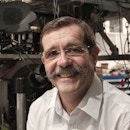From Einstein’s Doubts to Quantum Technologies: A New Quantum Revolution
- Speaker
-
 Alain Aspect, Ph.D.Professor , École Polytechnique
Alain Aspect, Ph.D.Professor , École Polytechnique
Augustin Fresnel Professor, Institut d'Optique Graduate School
Distinguished researcher emeritus, CNRS Regional Delegation Languedoc-Roussillon
Presidential Lectures are free public colloquia centered on four main themes: Biology, Physics, Mathematics and Computer Science, and Neuroscience and Autism Science. These curated, high-level scientific talks feature leading scientists and mathematicians and are intended to foster discourse and drive discovery among the broader NYC-area research community. We invite those interested in the topic to join us for this weekly lecture series.
By clicking to watch this video, you agree to our privacy policy.
The debate between Albert Einstein and Niels Bohr over the interpretation of quantum mechanics was settled by the experimental tests of Bell’s inequalities. Those experiments drew attention to the revolutionary character of quantum entanglement, which is now a key ingredient of quantum computing and quantum information.
In this lecture, Alain Aspect will first explain Einstein’s reasoning about entangled particles. That reasoning led to his conclusion that quantum mechanics is not complete, in contradiction with Bohr’s point of view. Aspect will then show how Bell’s inequalities have allowed experimentalists to settle the debate, emphasizing the most extraordinary features of entanglement and prompting the emergence of basic ideas for quantum information and quantum communication. These ideas are enabling the development of new technologies in many academic and industrial laboratories.
